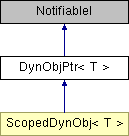DynObjPtr< T > Struct Template Reference
[Templates for DynI and friends]
#include <DynObjPtr.hpp>
Inheritance diagram for DynObjPtr< T >:

Public Types | |
| enum | { isStatic = 1, hasDoRef = 2, hasWeakRef = 4, hasStrongRef = 8 } |
Public Member Functions | |
| DynObjPtr () | |
| DynObjPtr (T *pt, bool try_strong_ref=false) | |
| DynObjPtr (DynObjPtr &dop) | |
| DynObjPtr & | operator= (T *pt) |
| DynObjPtr & | operator= (DynObjPtr< T > &dop) |
| DynObjPtr & | Assign (T *pt, bool try_strong_ref=false) |
| operator T * () | |
| operator T & () | |
| T & | operator* () |
| T * | operator-> () |
| T * | Get () |
| bool | HasStrongRef () |
| bool | IsOk () |
| bool | Release () |
Protected Member Functions | |
| bool | InternalAssign (T *pt, int try_strong_ref) |
| void | InternalRelease () |
| virtual bool docall | OnNotify (NotifierI *pni, int evt, NotifDataI *pnd) |
Protected Attributes | |
| char | m_flags |
| bool | m_flag_unused2 |
| bool | m_flag_unused1 |
| bool | m_flag_unused |
| T * | m_pt |
| union { | |
| NotifierI * m_pni | |
| DynObj * m_pdo | |
| }; | |
Detailed Description
template<class T>
struct DynObjPtr< T >
This is a smart DynObj pointer class. It relies on the held object being trackable in one or two of these ways: 1 - It implements NotifierI (giving off notfications in its dtor) 2 - It is a safely trackable DynObj (requires DoRunTime) 3 - It is a ref counted object and we hold a ref 4 - It is a static object from the main module and can be safely held. Even for case 3 (ref counting) we _still_ track object lifetime (using 1 or 2) in addition to pure ref counting. This allow for keeping our pointers safe even when a module is unloaded prematurely.So, if all objects instantiated from a plugin are held with a DynObjPtr, that plugin can be safely unloaded (with regards to valid pointers).
Constructor & Destructor Documentation
One argument constructor.
Member Function Documentation
Assignment operator.
- Parameters:
-
pt The DynObj we want to own.
Assignment operator.
- Parameters:
-
dop The DynObj we want to own.
template<class T>
| DynObjPtr& DynObjPtr< T >::Assign | ( | T * | pt, | |
| bool | try_strong_ref = false | |||
| ) | [inline] |
Assignment operator.
- Parameters:
-
pt The DynObj we want to own. try_strong_ref Attempt to create a shared ref on the object? (default: false).
template<class T>
| DynObjPtr< T >::operator T * | ( | ) | [inline] |
Access raw pointer.
template<class T>
| DynObjPtr< T >::operator T & | ( | ) | [inline] |
Access as a reference.
template<class T>
| T& DynObjPtr< T >::operator* | ( | ) | [inline] |
Access as a reference.
template<class T>
| T* DynObjPtr< T >::operator-> | ( | ) | [inline] |
Access raw pointer.
template<class T>
| T* DynObjPtr< T >::Get | ( | ) | [inline] |
Access raw pointer.
template<class T>
| bool DynObjPtr< T >::HasStrongRef | ( | ) | [inline] |
Returns true if we have a ref on a shared object
template<class T>
| bool DynObjPtr< T >::IsOk | ( | ) | [inline] |
Do we have an object now?
Reimplemented in ScopedDynObj< T >.
template<class T>
| bool DynObjPtr< T >::Release | ( | ) | [inline] |
Release our object in the suitable way
The documentation for this struct was generated from the following file:
 1.5.6
1.5.6